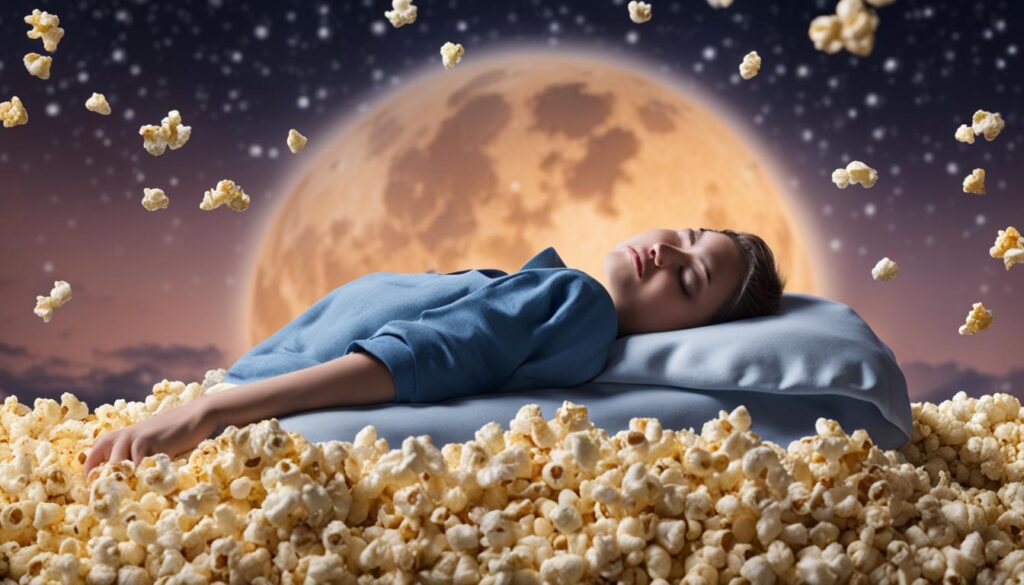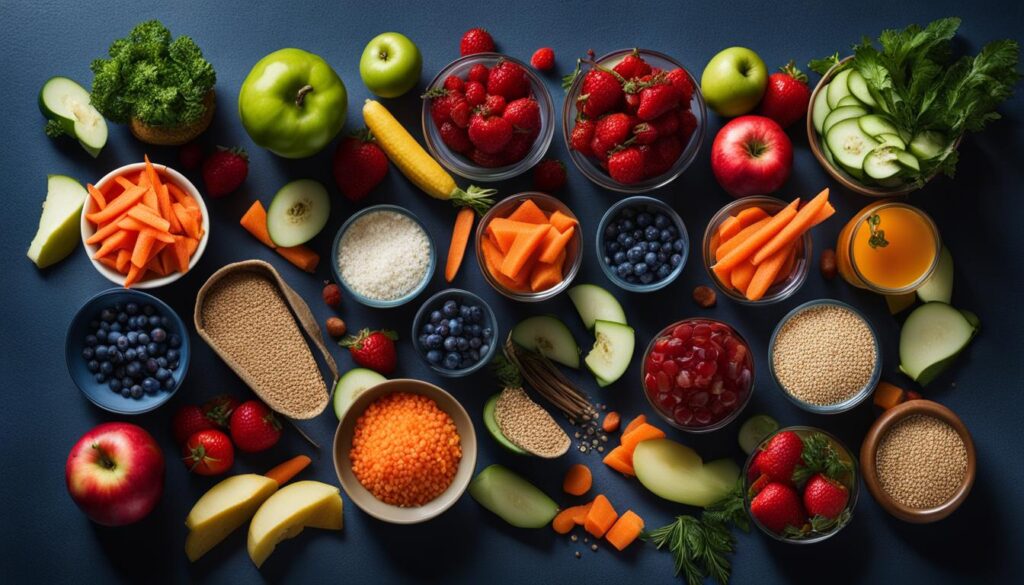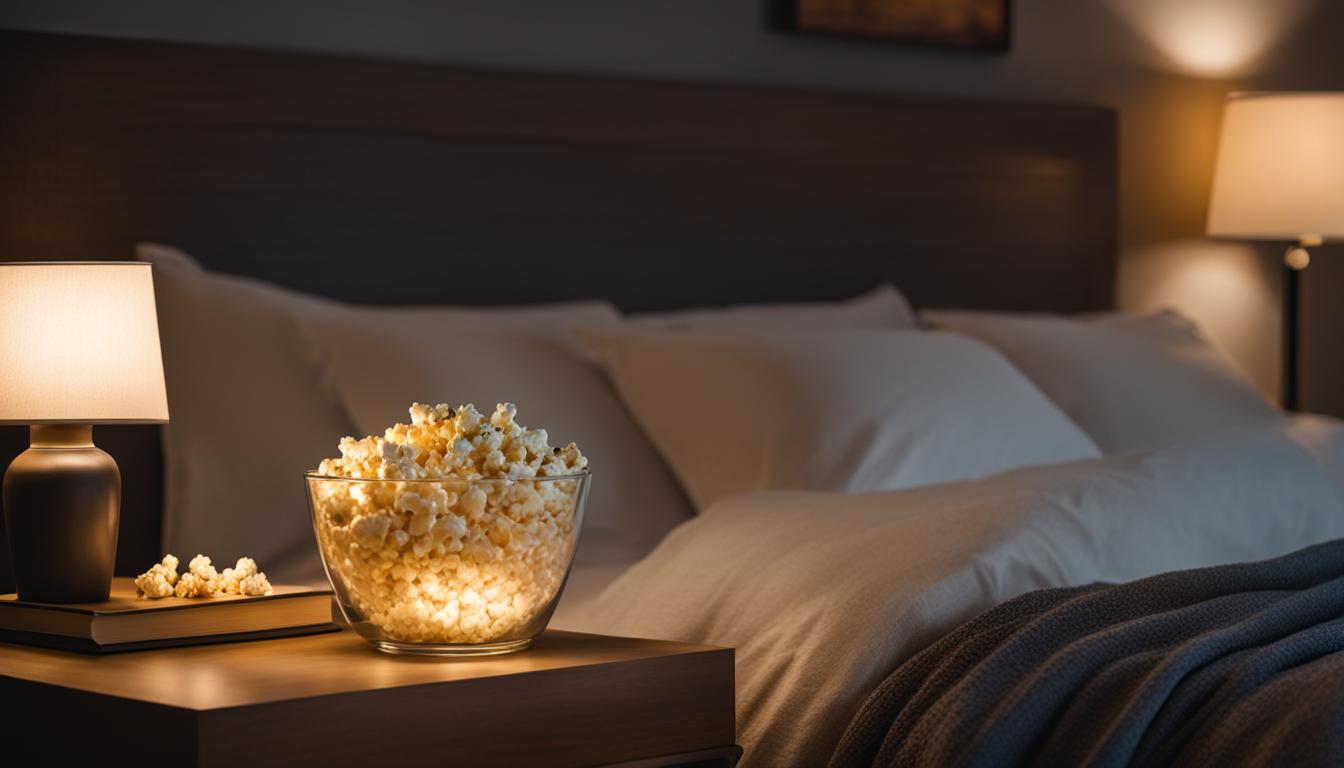Welcome to our article where we dive into the question: should I eat popcorn at night? Many of us enjoy snacking before bed, and popcorn has become a popular choice. But what are the benefits and disadvantages of indulging in this crunchy treat late in the evening? Let’s find out!
Popcorn can actually be a great snack before bed, offering several advantages. Firstly, it is low in calories, making it a guilt-free option. Additionally, popcorn is high in fiber, which aids in digestion and can help you feel full and satisfied. As a complex carbohydrate, it provides a steady release of energy throughout the night, keeping hunger at bay.
Moreover, popcorn is a whole grain that contains essential nutrients, promoting overall health and well-being. It also contributes to heart health by reducing cholesterol levels due to its polyphenol content. However, it’s important to note that excessive salt or unhealthy toppings can diminish these benefits, so it’s best to stick to plain, air-popped popcorn.
Key Takeaways:
- Eating popcorn at night can be a healthy choice due to its low-calorie and high-fiber content.
- Popcorn is a whole grain that provides essential nutrients and promotes heart health.
- Avoiding excess salt or unhealthy toppings is crucial to fully enjoy the benefits of eating popcorn at night.
- Portion control is important to prevent overeating and maintain a balanced diet.
- Choosing healthier alternatives to popcorn and practicing good dental hygiene are also important considerations.
Is Popcorn a Healthy Snack Before Bed?
Eating popcorn before bed can be a great way to satisfy your late-night cravings while also enjoying a healthy snack. Popcorn is low in calories and can be a good option for weight management. Its high fiber content helps promote digestion and keeps you feeling fuller for longer, which can prevent overeating during the night.
Not only is popcorn low in calories, but it is also a whole grain. Whole grains are known for their numerous health benefits, including promoting heart health and reducing the risk of chronic diseases. Popcorn contains polyphenols, antioxidants that help lower cholesterol levels and support overall cardiovascular health.
To make popcorn a healthier snack before bed, it’s important to be mindful of portion sizes and the toppings you choose. Opt for air-popped or lightly salted popcorn instead of buttered or heavily flavored varieties. You can also experiment with adding herbs and spices like cinnamon or chili powder for extra flavor without the added calories.
In summary, enjoying a serving of plain or lightly seasoned popcorn before bed can be a guilt-free way to satisfy your snack cravings. Its low-calorie content, high fiber content, and whole grain goodness make it a healthier alternative to other late-night snacks. Just remember to practice portion control and choose sensible toppings to make the most of this delicious and nutritious snack.
The Benefits of Popcorn Before Bed
- Low in calories, making it a good option for weight management.
- High in fiber, promoting digestive health and preventing late-night hunger pangs.
- Contains polyphenols, antioxidants that reduce cholesterol levels and support heart health.
- A whole grain snack that provides essential nutrients.
Tips for Healthy Popcorn Snacking
- Air-pop or lightly salted popcorn is a healthier choice than buttered or heavily flavored varieties.
- Experiment with herbs and spices like cinnamon or chili powder for added flavor without the extra calories.
- Practice portion control to prevent excessive snacking.
- Choose sensible toppings like nutritional yeast or grated Parmesan cheese instead of butter or heavy sauces.
The Impact of Popcorn on Sleep

When it comes to the impact of popcorn on sleep, it can vary from person to person. While some individuals may find that eating popcorn before bed doesn’t affect their sleep, others may experience increased alertness and difficulty falling asleep. This can be attributed to the presence of caffeine in popcorn.
Although popcorn doesn’t contain as much caffeine as coffee or tea, it still contains small amounts that can have a stimulant effect, especially if consumed in large quantities. This can lead to insomnia or disrupted sleep patterns for those who are sensitive to caffeine.
Therefore, if you’re someone who is easily affected by caffeine or experiences sleep issues, it’s recommended to avoid eating popcorn too close to bedtime. Instead, consider opting for other sleep-friendly snacks that do not contain caffeine, such as herbal tea or a small serving of warm milk.
Summary:
- Popcorn’s impact on sleep can vary from person to person.
- Some individuals may experience increased alertness and difficulty falling asleep due to the caffeine content in popcorn.
- If you’re sensitive to caffeine or experience sleep issues, it’s advisable to avoid eating popcorn close to bedtime.
Healthy Alternatives to Popcorn at Night

If you’re looking for healthier alternatives to popcorn for your late-night snacking, we’ve got you covered. While popcorn can be a good option, there are other nutritious snacks that can satisfy your cravings without interfering with your bedtime routine. Here are some delicious and healthy alternatives to consider:
1. Fruits
Instead of reaching for a bowl of popcorn, try indulging in some fresh fruits like apples or bananas. These fruits are low in calories, packed with natural sugars and fiber, and provide a satisfying crunch. They are a great source of vitamins and minerals, making them a nutritious option for a bedtime snack.
2. Yogurt or Cottage Cheese
If you’re in the mood for something creamy and protein-rich, opt for yogurt or cottage cheese. These dairy products are high in protein, which can promote sleep and help you feel full. Choose plain or Greek yogurt without added sugars and pair it with some berries for a burst of flavor. Cottage cheese can also be enjoyed with a sprinkle of cinnamon or a drizzle of honey.
3. Nuts and Seeds
If you prefer a snack that’s crunchy and packed with healthy fats, nuts and seeds are a great option. Almonds, walnuts, chia seeds, and flaxseeds are all nutritious choices that can provide essential nutrients, such as omega-3 fatty acids and fiber. Just be mindful of portion sizes, as nuts and seeds can be calorie-dense.
With these healthy alternatives, you can satisfy your late-night cravings while fueling your body with nutrients. Remember to listen to your hunger cues and choose snacks that align with your dietary preferences and goals. Happy snacking!
Tips for Eating Popcorn at Night
When it comes to enjoying popcorn as a nighttime snack, there are a few tips we recommend to ensure a delightful experience. By following these suggestions, you can make the most out of your popcorn indulgence without compromising your sleep or overall well-being.
1. Practice Portion Control
Portion control is key when snacking on popcorn before bed. While popcorn can be a healthy choice, it’s important not to overdo it. Stick to a reasonable portion size to avoid consuming excessive calories and disrupting your sleep. Consider measuring out a single serving of popcorn (around 1 ounce or 3 cups) and enjoying it mindfully.
2. Choose Healthier Toppings
Instead of dousing your popcorn in butter or other high-calorie toppings, opt for healthier alternatives. Sprinkle some nutritional yeast for a cheesy flavor without the added calories. Experiment with herbs and spices like garlic powder, paprika, or chili flakes to add a savory kick. You can also try a sprinkle of cinnamon and a drizzle of honey for a sweet and satisfying treat.
3. Mind Your Dental Hygiene
Popcorn kernels have a tendency to get stuck between teeth, which can be uncomfortable and lead to dental issues. Be sure to floss and brush your teeth after enjoying your popcorn snack to remove any lingering kernels. Taking care of your oral hygiene is essential for maintaining healthy teeth and gums.
By following these tips for eating popcorn at night, you can savor your favorite snack without any guilt or negative impacts on your sleep. Remember to practice portion control, choose healthier toppings, and take care of your dental hygiene. Now you can enjoy the satisfying crunch and delicious flavors of popcorn while snuggling up for a cozy evening.
Conclusion
In conclusion, we believe that eating popcorn before bed can be a satisfying and nutritious option for those looking for a bedtime snack. With its low calorie content, high fiber, and whole grain properties, popcorn offers several potential benefits. It can help curb late-night hunger, aid in weight management, and provide essential nutrients for heart health.
However, it’s important to exercise caution when indulging in popcorn at night. Portion control is key to prevent overeating, and it’s best to opt for plain, air-popped popcorn without excessive salt or unhealthy toppings. Additionally, if you are sensitive to caffeine, it may be wise to avoid eating popcorn too close to bedtime to minimize any potential impact on sleep quality.
While popcorn is a viable choice, there are also alternative healthy snacks to consider for late-night cravings. Fruits like apples or bananas can provide natural sugars and fiber, while yogurt or cottage cheese offer protein that can promote sleep. Ultimately, the decision of whether or not to enjoy popcorn as a bedtime snack depends on individual preferences and sensitivities.
So, if you choose to enjoy a bowl of popcorn before bed, remember to practice good dental hygiene and check for any kernels stuck between your teeth. We hope that our exploration of the benefits and considerations surrounding popcorn as a bedtime snack has helped you make an informed decision. Sleep well!
FAQ
Should I Eat Popcorn at Night?
Eating popcorn at night can be a healthy option. It is low in calories, high in fiber, and a whole grain.
What are the Benefits of Eating Popcorn at Night?
Popcorn is a filling and low-calorie snack that can prevent late-night hunger pangs and promote weight management. It is high in fiber, aids in digestive health, and contains polyphenols that reduce cholesterol levels.
Are There Any Disadvantages of Eating Popcorn at Night?
While popcorn can be a healthy snack, it’s important to be mindful of portion sizes and avoid excessive salt or unhealthy toppings. It may also contain caffeine, which can affect sleep for those who are sensitive to it.
Is Popcorn a Healthy Snack Before Bed?
Yes, popcorn can be a healthy snack before bed due to its low calorie and fiber content. However, it’s important to choose plain popcorn and avoid high-calorie toppings.
What is the Impact of Popcorn on Sleep Quality?
The impact of popcorn on sleep can vary from person to person. While some may not experience any issues, others may find it increases alertness and makes it difficult to fall asleep due to the caffeine content.
Are There Healthier Alternatives to Popcorn at Night?
Yes, there are healthier alternatives to consider for late-night snacking. Fruits like apples or bananas are low in calories and provide natural sugars and fiber. Yogurt or cottage cheese, which are high in protein, can also promote sleep.
What Tips Should I Follow for Eating Popcorn at Night?
It’s best to opt for plain popcorn and avoid high-calorie toppings. Portion control is important to prevent overeating, and drinking plenty of water can help with digestion. Additionally, practicing good dental hygiene is important to check for any kernels stuck between your teeth.
What is the Conclusion about Eating Popcorn at Night?
The decision of whether or not to eat popcorn before bed depends on individual preferences and sensitivities. It can be a healthy option when consumed in moderation and with plain, air-popped popcorn.

Leave a Reply